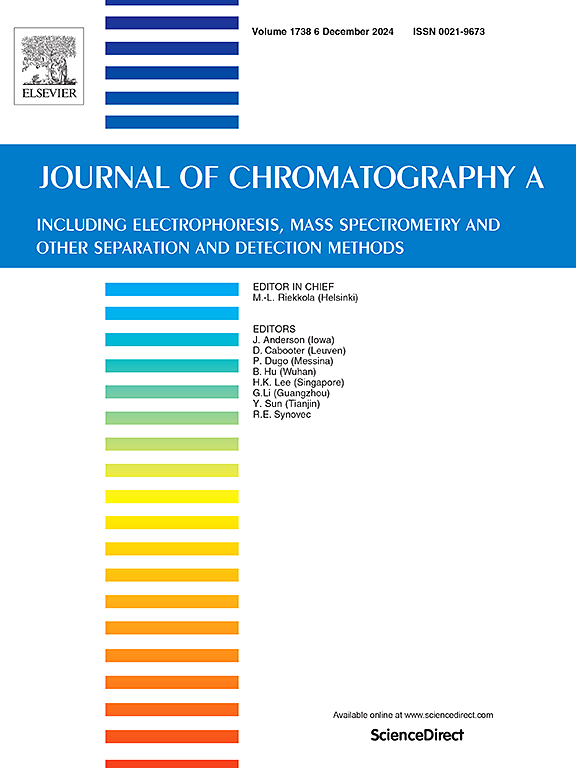Direct lipid analysis of exosomes in serum by online miniaturized asymmetrical flow field-flow fractionation and electrospray ionization-mass spectrometry: Application to extrahepatic cholangiocarcinoma
IF 3.8
2区 化学
Q1 BIOCHEMICAL RESEARCH METHODS
引用次数: 0
Abstract
Exosomes are submicron-sized extracellular vesicles involved in immune regulation, tumor metastasis, and cellular communication. Their lipid composition, distinct from parental cells, plays a crucial role in diseases like cancer. However, lipidomic analysis of exosomes, particularly in complex samples like blood, requires advanced techniques. This study optimizes miniaturized flow field-flow fractionation (mFlFFF) coupled with electrospray ionization mass spectrometry (ESI-MS) for direct lipidomic analysis of exosomes in serum. The mFlFFF technique resolves exosomes for size-based lipid analysis without prior extraction. Lipidomic profiling of serum exosomes from patients with extrahepatic cholangiocarcinoma (eCCA) identified over 1000 lipid species, with 64 showing significant changes compared to healthy controls. Target lipids were analyzed by mFlFFF-ESI-MS, revealing 35 species that distinguish eCCA patients from controls, suggesting their potential as biomarkers. Elevated levels of lysophosphatidylcholine, phosphatidylcholine, phosphatidylethanolamine, and phosphatidylinositol (PI) were observed in the eCCA group, indicating lipid alterations linked to cancer progression and inflammation. Notably, PI 38:4, involved in the release of arachidonic acid, highlights its role in inflammatory processes associated with cancer. This study demonstrates the potential of mFlFFF-ESI-MS for lipidomic analysis of exosomes and offers a non-invasive approach for cancer diagnosis, with future implications for therapeutic targeting of lipid pathways in cholangiocarcinoma.
求助全文
约1分钟内获得全文
求助全文
来源期刊

Journal of Chromatography A
化学-分析化学
CiteScore
7.90
自引率
14.60%
发文量
742
审稿时长
45 days
期刊介绍:
The Journal of Chromatography A provides a forum for the publication of original research and critical reviews on all aspects of fundamental and applied separation science. The scope of the journal includes chromatography and related techniques, electromigration techniques (e.g. electrophoresis, electrochromatography), hyphenated and other multi-dimensional techniques, sample preparation, and detection methods such as mass spectrometry. Contributions consist mainly of research papers dealing with the theory of separation methods, instrumental developments and analytical and preparative applications of general interest.
 求助内容:
求助内容: 应助结果提醒方式:
应助结果提醒方式:


